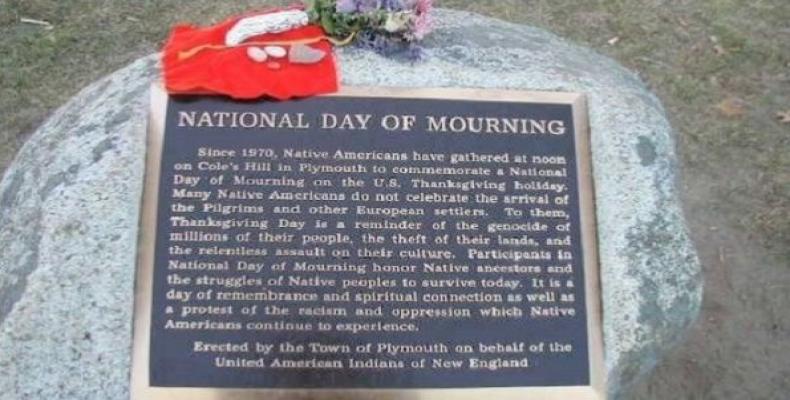Boston, November 24 (RHC)-- Hundreds of Native American people and their supporters gathered in the U.S. state of Massachusetts on Thursday -- Thanksgiving Day -- for a “National Day of Mourning” at Plymouth Rock. “Indigenous people give thanks all the time. We’re not against giving thanks, and we’re not against people having meals with their families,” said Mahtowin Munro, co-leader of United American Indians of New England, the organization behind the annual event.
Since 1970, the site has served as a platform to bring awareness to Native American struggles as well as a day of remembrance dedicated to the culture, family, and history of Indigenous communities in the United States. “As Indigenous people, we’ve been taught by our elders to give thanks every day. We are a people who have survived genocide,” Monroe said.
“The real underlying issue is this idea that the Pilgrims were so wonderful and amazing, that they came over and Native people were happy to see them, and they all sat down together and live happily ever after,” she explained. “And that then, Native people just faded away,” she continued.
The story, she says is a “whitewashed” version of history and celebrating the event only perpetuates ignorance of what really transpired. The “fantasy history” attempts to erase the hundreds of years of murders, seizures of traditional lands, damming of rivers, and deliberate hunting of bison, the main substance for food, clothing, and life in the communities.
In addition to the march and rally, the movement also takes the opportunity to bring awareness to current world issues. Some of this years' topics target the present state of Mexico and Puerto Rico and parts of the Caribbean after suffering extreme natural disasters. “With Puerto Rico and the Caribbean, that is the part of the world where [Christopher] Columbus and colonialism hit first,” Monroe said. “Because we’ve been colonized as a result of Europeans coming here, with our land taken from us, we certainly feel strong solidarity with them.”
“We say that ‘we cry from each other's eyes. Even if it's not exactly my people and my struggle,” Monroe said, referring to Mexico’s earthquake and the Caribbean's hurricanes earlier this year. “I’m going to feel really grateful to be there with other Native people, and Black people, Asian people, Arab people, white people, Latin people, and to feel these struggles together and cry from each other's eyes. It’s an important thing to unite us and help to heal us as human beings."
Anti-Thanksgiving Protest in U.S. -- 'National Day of Mourning'

Related Articles
Commentaries
MAKE A COMMENT
All fields requiredMore Views
- Cuba explores technique to reduce vector population
- UN warns that nearly 55 million face hunger in West and Central Africa
- Extradition of Julian Assange edges closer as U.S. claims it will respect his human rights
- Artificial intelligence platform is developed in Cuba
- FAO assists Cuba in forest protection

